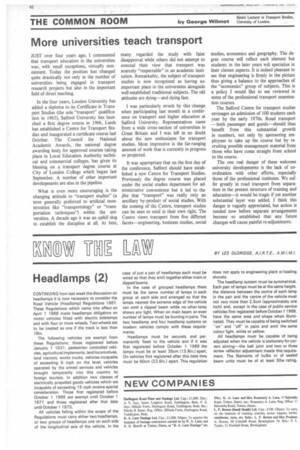More universities teach transport
Page 64

If you've noticed an error in this article please click here to report it so we can fix it.
JUST over four years ago, I commented that transport education in the universities was, with small exceptions, virtually nonexistent. Today the position has changed quite drastically not only in the number of universities being engaged in transport research projects but also in the important field of direct teaching.
In the four years. London University has added a diploma to its Certificate in Transport Studies (the sole "transport" qualification in 1965), Salford University has launched a first degree course in 1966, Leeds has established a Centre for Transport Studies and inaugurated a certificate course last October. The Council for National Academic Awards, the national degree awarding body for approved courses taking place in Local Education Authority technical and commercial colleges, has given its blessing on a transport degree course at City of London College which began last September. A number of other important developments are also in the pipeline.
What is even more encouraging is the changing attitude to "transport studies" (a term generally preferred to artificial monstrosities like "transportology" or "transportation techniques") within the universities. A decade ago it was an uphill slog to establish the discipline at all. At best,
many regarded the study with faint disapproval while others did not attempt to conceal their view that transport was scarcely -respectable" in an academic institution. Remarkably, the subject of transport studies is now recognized as having an important place in the universities alongside well-established traditional subjects. The old attitudes are dying—and dying fast.
I was particularly struck by this change when participating last month in a conference on transport and higher education at Salford University. Representatives came from a wide cross-section of universities in Great Britain and I was left in no doubt about the new enthusiasm for transport studies. Most impressive is the far-ranging amount of work that is currently in progress or projected.
It was appropriate that on the first day of the conference, Salford should have established a new Centre for Transport Studies. Previously the degree course was placed under the social studies department for administrative convenience but it led to the jibe that "transport" was really only an ancillary by-product of social studies. With the coming of the Centre, transport studies can be seen to exist in their own right. The Centre views transport from five different facets—engineering, business studies, social studies, economics and geography. The degree course will reflect each element but students in the later years will specialize in their chosen aspects. It is indeed pleasant to see that engineering is firmly in the picture thus giving a balance to the approaches of the "economics" group of subjects. This is a policy I would like to see reviewed in some of the professional transport examination courses.
The Salford Centre for transport studies envisages an admission of 100 students each year by the early 1970s. Road transport —both passenger and goods—should thus benefit from this substantial growth in numbers, not only by sponsoring employees to take up the course but by recruiting possible management material from those who have come straight from school to the course.
The one real danger of these welcome university developments is the lack of coordination with other efforts, especially those of the professional institutes. We suffer greatly in road transport from separatism in the present structure of training and education—it would be tragic if yet another substantial layer was added. I think this danger is vaguely appreciated, but action is needed now before separate arrangements become so established that any future changes will cause painful re-adjustments.








































































































